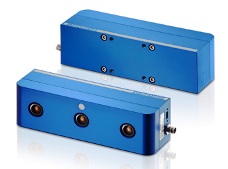|
||||||||||||||||||||||||||||||||||||||||||
|
||||||||||||||||||||||||||||||||||||||||||
| Ensenso
N10 3D stereo Back to iDS Cameras Back to 3D Cameras Back to USB 2.0 Cameras Back to Standard Resolution Monochrome Cameras Back to Standard Resolution Colour Cameras |
 |
Fitted with two global shutter CMOS sensors and a pattern projector, the camera uses a new technique called "projected texture stereo vision" which, together, project a random dot pattern onto the object being captured. Using the projected texture stereo vision procedure, the projector projects a static, high contrast texture onto the scene and adds structures that are not visible or are only faintly visible on the object. The key advantage of the pattern projection is that it also works in multi-camera operation and is ideal for capturing unstructured surfaces. Additionally, using multiple cameras simultaneously enables the capture of a scene synchronously from different sides and so reducing shadowing effects and also extending the field of view.
Combined with the new “semi-global matching” image comparison
algorithm, the Ensenso N10 captures nearly all surfaces within the field
of vision working with pulsed infrared light and is highly resistant to
external light influences.
Designed for working designed of 280 mm to 1400 mm and for variable fields
of view, unlike other 3D recording procedures, the Ensenso N10 can capture
both static and moving objects at up to 30 frames per second.
The Ensenso N10's robust aluminum housing measures a compact 150 x 45 x 45 mm. A lockable 3-pin M8 sensor/acuator connector with GPIOs for 12-24 V hardware trigger input and output, as well as a lockable USB cable make this camera suitable for industrial applications.
Integrating the camera into applications is easy using software which
is supplied free. As the Ensenso N10 is factory calibrated, installation
of the camera for 3D surface matching using the MVTec Halcon interface
takes less than ten minutes out of the box. Using the free software interface
supplied, the camera can easily be integrated into your own application
programs.
Applications
Applications in the areas of medical engineering,
robotics and gripping technology, logistics, completeness checking, rapid
volume measurement, as well as measurement technology and
safety engineering benefit particularly from the innovative camera.
With a refresh rate of 30 frames per second, the Ensenso N10 can
be used completely in-line and is therefore ideal for use in 100% inspections.
| Benefits and key features | |
| • USB 2.0 interface: for flexible integration | • Compact and robust alloy housing |
| • 2 Global Shutter CMOS sensors plus pattern projector | • Camera/3D image resolution: 752 x 480 pixel |
| • Powerful and fast: 30 frames per second at full resolution and 64 disparities | • Working distances from 280 to 1400 mm and variable image fields |
| • Precise control over resolution, fame rate, exposure time and trigger point | • Live 3D using multiple cameras |
| • Using projected texture stereo vision to capture surfaces with no structures | • Captures static or moving objects |
| • Comprehensive software package included free: object-oriented API (C++) for Windows and Linux for easy integration | |
|
|
|||
| Model | Ensenso N10
3d Stereo Camera |
||
| Sensor | 2 x CMOS | ||
| Resolution | 752 x 480 pixel (WVGA) | ||
| Max frame rate | 30 fps at full resolution | ||
| Working distance | 280 - 1400 mm | ||
| Image fields | User-selected | ||
| Z-resolution | 0,1 bis 1,2 mm | ||
| Weight | 400 g | ||
| Power supply | via USB Bus (5V, 500mA, 2.5W) | ||
|
If you like this page, please recommend and share it. |
|||
| More | |||



